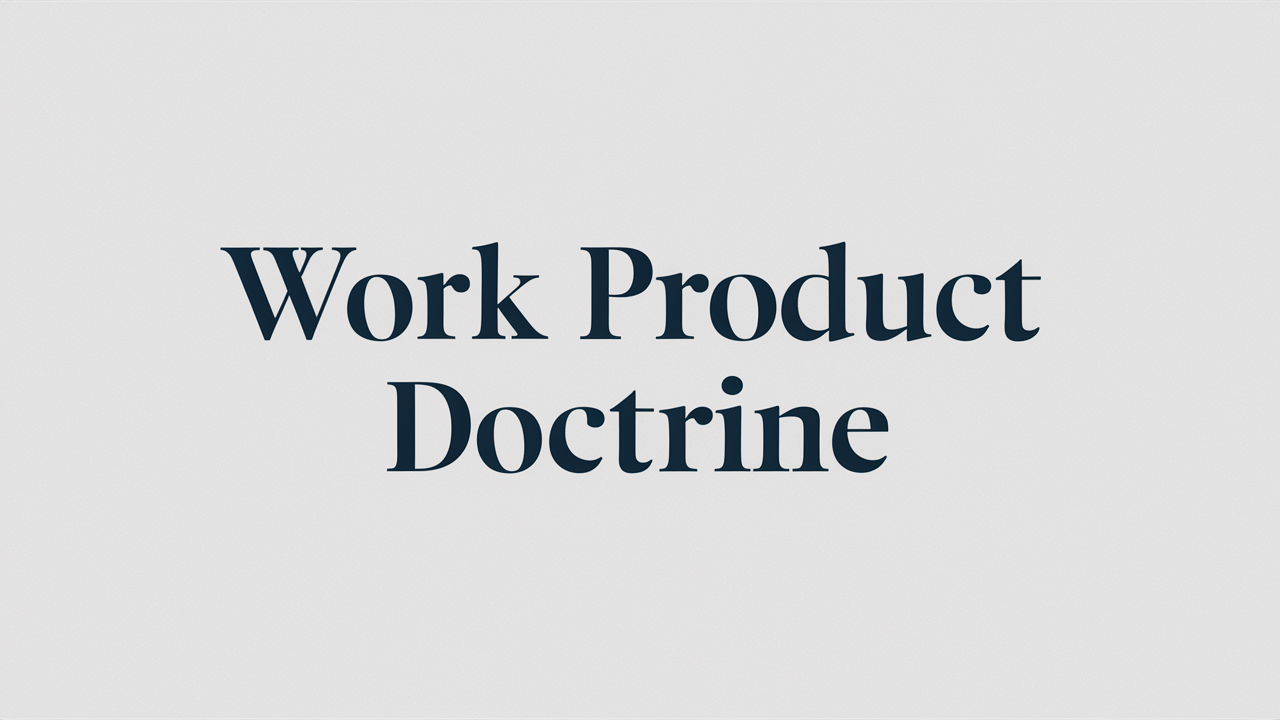Safeguarding the strategies and thought processes involved in case preparation allows attorneys to preserve the integrity of their case preparations. The work product doctrine serves as a pivotal legal principle in this context, providing attorneys with a shield to protect their preparatory materials from disclosure during litigation. Understanding this doctrine is essential for legal professionals to ensure their strategic documents remain confidential.
What is the Work Product Doctrine?
The work product doctrine, also known as the attorney work product rule, is a legal principle that protects materials prepared by attorneys or their agents in anticipation of litigation from being disclosed to the opposing party. This doctrine was first articulated by the U.S. Supreme Court in the landmark case Hickman v. Taylor (1947). The Supreme Court recognized that allowing unfettered access to an attorney’s preparatory materials would undermine the adversarial nature of litigation, leading to a chilling effect on the thoroughness and creativity of legal preparation (Daily Searches).
Scope of Protection
The work product doctrine encompasses a wide range of materials, including documents, notes, mental impressions, conclusions, opinions, and legal theories prepared by or for an attorney. The protection extends to both tangible and intangible materials, provided they were created in anticipation of litigation. This includes:
- Written notes: Attorney notes from interviews, meetings, or case strategy sessions.
- Drafts of legal documents: Preliminary versions of briefs, memos, and other legal filings.
- Investigative reports: Documents prepared by investigators or consultants hired by the attorney.
However, the protection is not absolute. While opinion work product (reflecting the attorney’s thoughts and legal theories) enjoys near-absolute protection, factual work product (containing factual information) may be subject to disclosure if the opposing party demonstrates a substantial need and an inability to obtain the information by other means without undue hardship .
Exceptions and Limitations
Despite its broad protective scope, the work product doctrine has limitations. It does not shield materials prepared in the ordinary course of business, as opposed to those specifically prepared for litigation. Additionally, if an attorney shares the protected materials with third parties outside the attorney-client relationship, the protection may be waived. For example, sharing documents with experts or consultants can maintain the protection if the third party is an agent of the attorney, but sharing those same materials with an unrelated third party might lead to waiver.
Furthermore, the doctrine does not apply uniformly across all jurisdictions. While federal courts follow the principles set forth in Hickman v. Taylor, state courts may have variations in their application and interpretation of the doctrine.
Practical Implications for Legal Practice
For legal practitioners, understanding the nuances of the work product doctrine is critical to protect disclosure of protected materials. Here are some practical steps to ensure the protection of work product:
- Clearly label materials: Mark documents and notes as “prepared in anticipation of litigation” to clarify their protected status.
- Limit distribution: Share protected materials only with individuals directly involved in the case to avoid waiver.
- Document preparation: Maintain a clear distinction between materials prepared for litigation and those created in the regular course of business.
By diligently adhering to these practices, attorneys can safeguard their strategic planning and ensure that their work product remains protected from disclosure throughout the litigation process. Legal professionals can also refer to resources such as the American Bar Association (ABA) guidelines and federal and state-specific rules on the work product doctrine. For litigation support and services, contact Baer Reed today.









 Mr. Reyes graduated with honors from the Ateneo de Manila University, where he received the Procter and Gamble Student Excellence Award. He obtained his Juris Doctor degree from the Ateneo de Manila School of Law. During law school, Mr. Reyes was part of the Philippine delegation to the Willem C. Vis International Commercial Arbitration Moot held in Vienna, Austria. He was also a member of the Ateneo Society of International Law and the St. Thomas More Debate Society. He completed his internship at the Public Attorney’s Office. He wrote a thesis entitled: “To Kill A White Elephant: An Analysis of the Fiduciary Exception to the Corporate Attorney-Client Privilege”. Mr. Reyes is admitted to practice law in the Philippines and the State of New York.
Mr. Reyes graduated with honors from the Ateneo de Manila University, where he received the Procter and Gamble Student Excellence Award. He obtained his Juris Doctor degree from the Ateneo de Manila School of Law. During law school, Mr. Reyes was part of the Philippine delegation to the Willem C. Vis International Commercial Arbitration Moot held in Vienna, Austria. He was also a member of the Ateneo Society of International Law and the St. Thomas More Debate Society. He completed his internship at the Public Attorney’s Office. He wrote a thesis entitled: “To Kill A White Elephant: An Analysis of the Fiduciary Exception to the Corporate Attorney-Client Privilege”. Mr. Reyes is admitted to practice law in the Philippines and the State of New York. Matthew Hersh earned a B.A. in Political Science from Columbia University in 1990 and graduated cum laude from Georgetown University Law Center in 1999. He also holds a master’s degree in international relations from the Georgetown University School of Foreign Service.
Matthew Hersh earned a B.A. in Political Science from Columbia University in 1990 and graduated cum laude from Georgetown University Law Center in 1999. He also holds a master’s degree in international relations from the Georgetown University School of Foreign Service.
 Cap. Avi Levak (Res. IDF) graduated from from Israel’s prestigious Ben-Gurion University of the Negev with a Bachelor of Science in Computer Science and Mathematics. He is also a Leadership and Communication coach trained in TuT coaching by Alon gal in Israel. Avi specializes in high-level, in-depth analysis of business and client needs, within systems and software strategy and architecture.
Cap. Avi Levak (Res. IDF) graduated from from Israel’s prestigious Ben-Gurion University of the Negev with a Bachelor of Science in Computer Science and Mathematics. He is also a Leadership and Communication coach trained in TuT coaching by Alon gal in Israel. Avi specializes in high-level, in-depth analysis of business and client needs, within systems and software strategy and architecture. Ms. Lardizabal-Manzano is a graduate of San Sebastian College-Recoletos, where she earned her B.A. in Political Science. In 2003, she received her law degree from Lyceum of the Philippines and was admitted to practice law in 2004.
Ms. Lardizabal-Manzano is a graduate of San Sebastian College-Recoletos, where she earned her B.A. in Political Science. In 2003, she received her law degree from Lyceum of the Philippines and was admitted to practice law in 2004. Mr. De Guzman graduated from San Beda College with a degree of Bachelor of Arts Major in Economics and received his law degree from San Beda College of Law. He is multilingual and is fluent in three languages: Chinese, Filipino, and English. He was admitted to the Philippine Bar in 2003.
Mr. De Guzman graduated from San Beda College with a degree of Bachelor of Arts Major in Economics and received his law degree from San Beda College of Law. He is multilingual and is fluent in three languages: Chinese, Filipino, and English. He was admitted to the Philippine Bar in 2003. Ms. Aquino-Batallones obtained a Bachelor of Arts degree in Development Studies (with Minors in Global Politics and Hispanic Studies) from the Ateneo de Manila University. In 2011, she received her Juris Doctor degree from Ateneo de Manila University School of Law. During law school, she interned at Romulo Mabanta Buenaventura Sayoc & de los Angeles then became an intern of Ateneo Legal Services Center’s Clinical Legal Education Program.
Ms. Aquino-Batallones obtained a Bachelor of Arts degree in Development Studies (with Minors in Global Politics and Hispanic Studies) from the Ateneo de Manila University. In 2011, she received her Juris Doctor degree from Ateneo de Manila University School of Law. During law school, she interned at Romulo Mabanta Buenaventura Sayoc & de los Angeles then became an intern of Ateneo Legal Services Center’s Clinical Legal Education Program.
 Ms. Cruz-Anonuevo graduated cum laude and top nine in her batch from Miriam College with a degree of Bachelor of Arts in InternationalStudies. She obtained her Juris Doctor degree from Ateneo de Manila University School of Law in Rockwell. During law school, she interned in Rivera, Santos, Maranan & Associates. She was also part of Ateneo’s Labor Law Bar Operations. She wrote her thesis on, “Stealing Privacy: Limitations on Media’s Photographic Invasion.,” Ms. Cruz-Anonuevo is admitted to practice law in the Philippines.
Ms. Cruz-Anonuevo graduated cum laude and top nine in her batch from Miriam College with a degree of Bachelor of Arts in InternationalStudies. She obtained her Juris Doctor degree from Ateneo de Manila University School of Law in Rockwell. During law school, she interned in Rivera, Santos, Maranan & Associates. She was also part of Ateneo’s Labor Law Bar Operations. She wrote her thesis on, “Stealing Privacy: Limitations on Media’s Photographic Invasion.,” Ms. Cruz-Anonuevo is admitted to practice law in the Philippines. Ms. Tyler graduated cum laude from Georgetown University and received her law degree, cum laude, from Georgetown University Law Center. During law school, she interned at the United Nations Economic Commission for Europe. She also worked on The Tax Lawyer journal and was a member of the award-winning Barristers’ Council Mock Trial Team. Ms. Tyler is admitted to practice law in the State of California and the District of Columbia.
Ms. Tyler graduated cum laude from Georgetown University and received her law degree, cum laude, from Georgetown University Law Center. During law school, she interned at the United Nations Economic Commission for Europe. She also worked on The Tax Lawyer journal and was a member of the award-winning Barristers’ Council Mock Trial Team. Ms. Tyler is admitted to practice law in the State of California and the District of Columbia.